
Decentralized Finance (DeFi) is transforming the financial landscape by eliminating intermediaries and giving users direct control over their assets. Unlike traditional banking systems, which rely on centralized authorities, DeFi operates on blockchain technology, ensuring transparency, security, and accessibility. This new financial ecosystem enables users to earn interest, borrow funds, trade assets, and more without the need for banks or other third parties.
With the rise of blockchain adoption, DeFi has gained immense popularity, offering numerous advantages over traditional financial systems. But what makes DeFi so revolutionary? In this article, we’ll explore seven key benefits of Decentralized Finance (DeFi), highlighting its potential to reshape the way we interact with money. We’ll also look at real-world applications, comparisons with traditional finance, and expert insights into the future of DeFi.
Let’s dive into the advantages of DeFi and how they can benefit users across the globe.
1. Greater Financial Inclusion 🌍
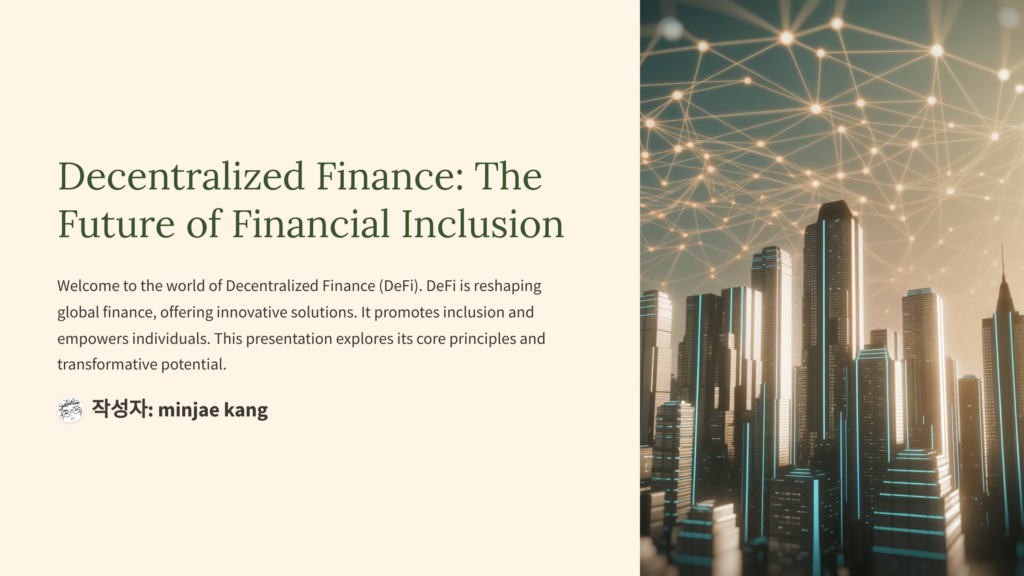
One of the most significant benefits of DeFi is its ability to provide financial services to anyone with an internet connection. Traditional banking systems require extensive documentation, credit history checks, and geographical accessibility, which excludes millions of unbanked individuals worldwide.
🔹 How DeFi Helps
- No credit checks or extensive paperwork
- Accessible from anywhere in the world
- Lower fees compared to traditional banking
- Enables direct peer-to-peer transactions
A great example of DeFi promoting financial inclusion is Aave, a decentralized lending protocol that allows users to borrow and lend without a bank account.
2. Elimination of Intermediaries 🏦❌
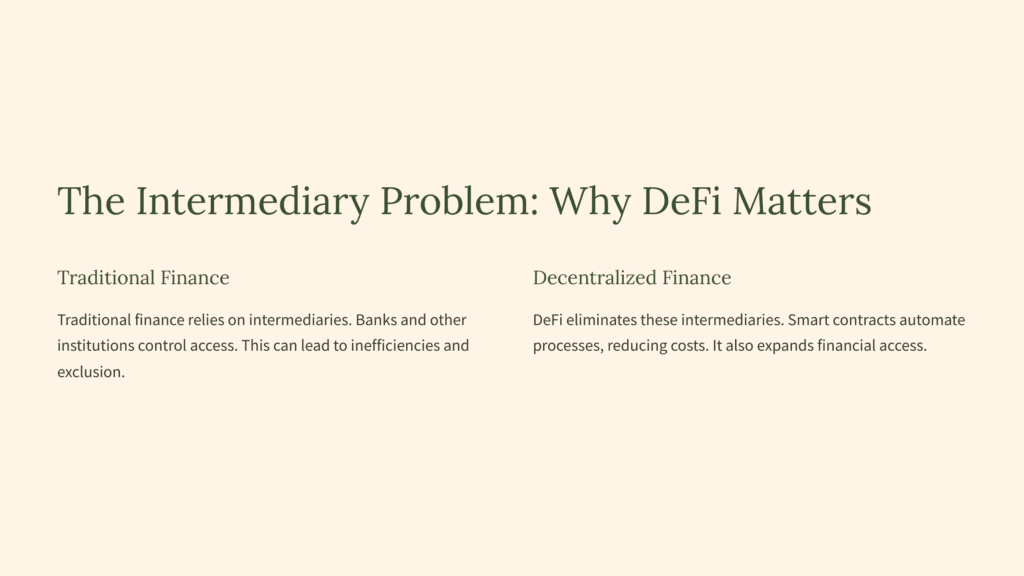
In traditional finance, banks, brokers, and other intermediaries charge fees for transactions, loans, and financial services. DeFi removes the need for these middlemen, reducing costs and increasing efficiency.
🔹 Key Advantages
- Faster transactions without third-party delays
- Lower fees compared to banks and financial institutions
- Users have full control over their assets
- Smart contracts automate processes, reducing human error
One example is Uniswap, a decentralized exchange (DEX) that allows users to trade cryptocurrencies directly from their wallets without an intermediary.
3. Enhanced Transparency and Security 🔍🔐

DeFi operates on blockchain networks, ensuring that every transaction is publicly recorded and verifiable. This eliminates fraud, corruption, and manipulation by central authorities.
🔹 Security Benefits
- Immutable blockchain records prevent data tampering
- Decentralized protocols reduce risks of a single point of failure
- Users retain ownership of their private keys and funds
- Audited smart contracts improve trustworthiness
For example, MakerDAO, the platform behind the DAI stablecoin, provides complete transparency in governance and operations.
4. Higher Interest Rates on Savings 📈💰
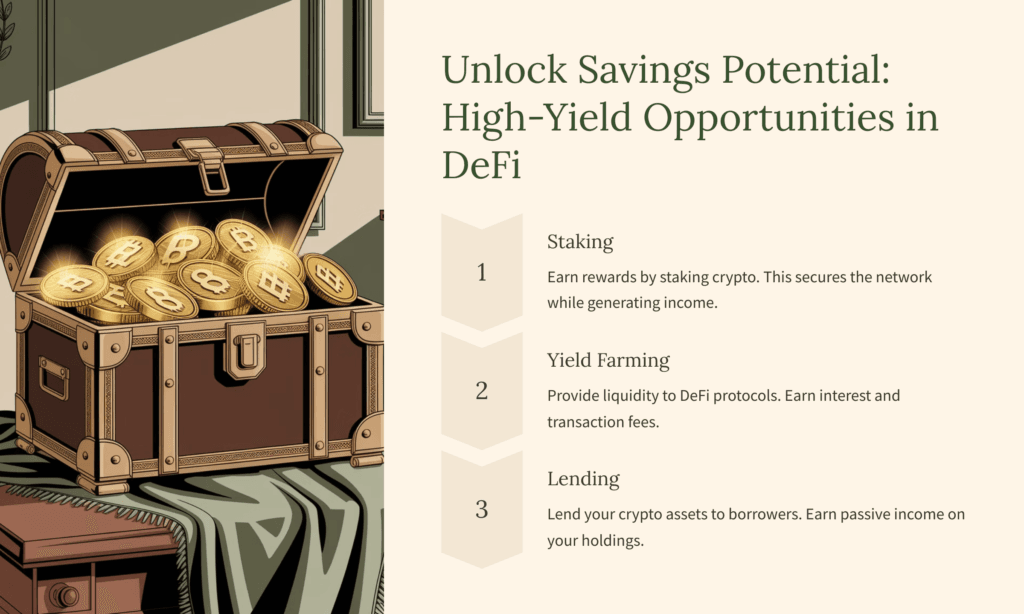
Traditional savings accounts offer minimal interest rates, often below 1%. DeFi protocols, on the other hand, allow users to earn significantly higher interest through liquidity pools and yield farming.
🔹 Why DeFi Offers Better Returns
- Decentralized lending eliminates middlemen costs
- Users can earn rewards by providing liquidity
- Staking tokens generates passive income
- Interest rates adjust dynamically based on supply and demand
A leading DeFi savings platform is Compound, where users can deposit assets and earn interest in real-time.
5. 24/7 Accessibility and Programmable Transactions 🕒⚡
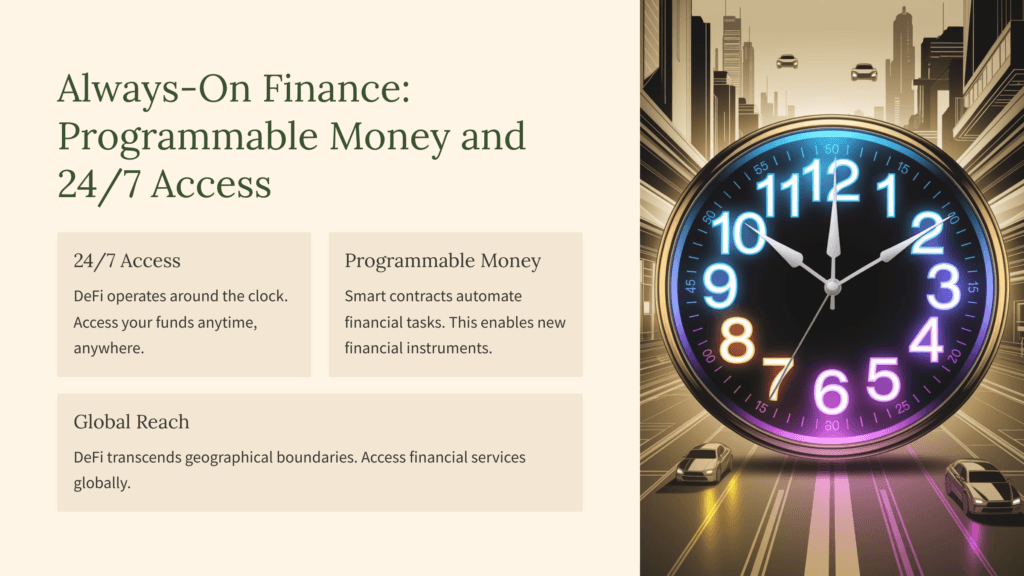
Unlike traditional banks that operate during business hours, DeFi platforms are accessible 24/7, allowing users to transact anytime, anywhere.
🔹 Key Features
- No banking hours or delays
- Automated smart contracts execute transactions instantly
- No need for approvals from financial institutions
- Works globally, regardless of time zones
For example, Yearn Finance automates yield farming strategies, optimizing returns for users without requiring manual intervention.
6. Permissionless and Censorship-Resistant Transactions 🛑🚀

DeFi is built on open-source, permissionless blockchains, meaning anyone can participate without needing approval from banks, governments, or regulators.
🔹 Why This Matters
- No restrictions based on location, nationality, or financial status
- Cannot be blocked or censored by governments
- Users control their assets without third-party interference
- Encourages financial sovereignty and self-custody
One powerful example is Bitcoin and Ethereum, which provide decentralized alternatives to government-controlled financial systems.
7. Diverse Financial Services Beyond Banking 🔄💳
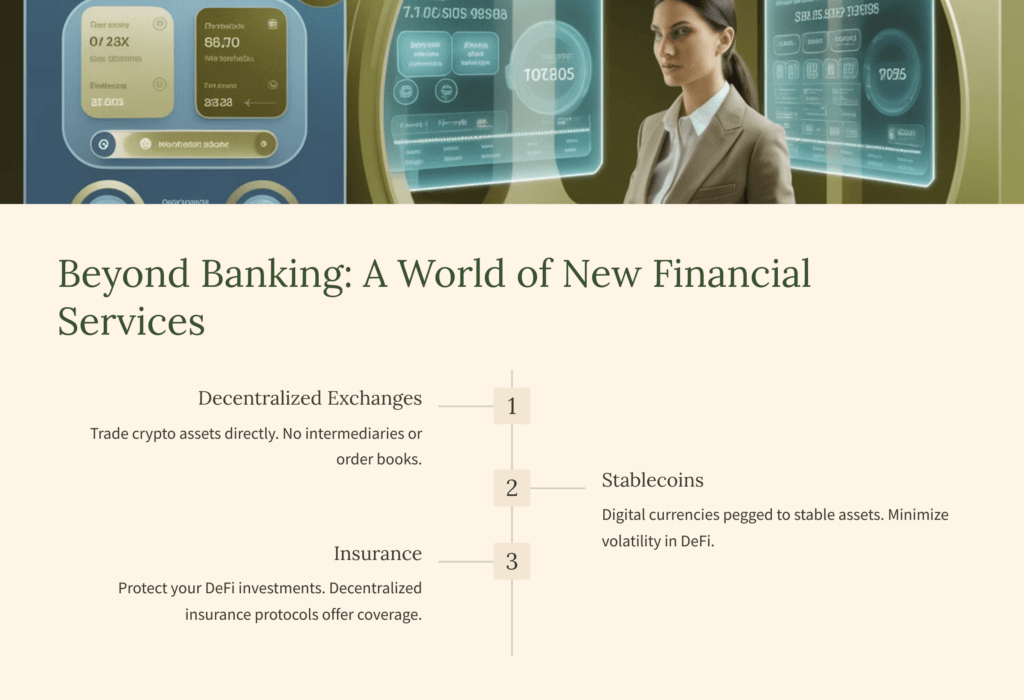
DeFi is more than just an alternative to banks—it offers a wide range of financial services, including:
🔹 DeFi Applications
- Decentralized exchanges (DEXs) for trading crypto assets
- Lending and borrowing protocols for earning interest or accessing capital
- Stablecoins that provide a safe store of value
- NFT marketplaces for digital assets and collectibles
For instance, Opensea is a leading decentralized NFT marketplace where users can buy and sell digital assets without relying on centralized platforms.
DeFi vs. Traditional Finance 🏛️⚖️
| Feature | Traditional Finance | Decentralized Finance (DeFi) |
|---|---|---|
| Accessibility | Requires bank accounts & ID | Open to anyone with internet |
| Control | Bank controls assets | Users fully control funds |
| Transaction Speed | Slow (days to process) | Instant transactions |
| Fees | High due to intermediaries | Lower due to automation |
| Transparency | Limited, bank-led decisions | Fully transparent on blockchain |
| Security Risks | Centralized control, data breaches | Decentralized, lower risk of fraud |
Real-World Use Cases of DeFi 💡
1️⃣ Borrowing & Lending – Users can take loans without credit checks on platforms like Aave.
2️⃣ Yield Farming – Earn passive income by staking tokens on Yearn Finance.
3️⃣ Cross-Border Payments – Send funds globally at lower fees via stablecoins.
4️⃣ Tokenization of Assets – Convert real-world assets into blockchain tokens.
5️⃣ Decentralized Identity – Use blockchain-based ID systems for financial inclusion.
Conclusion: The Future of Decentralized Finance 🚀
Decentralized Finance (DeFi) is rapidly changing the financial landscape by offering open, transparent, and efficient alternatives to traditional systems. With the elimination of intermediaries, improved security, and greater accessibility, DeFi is empowering individuals to take control of their finances like never before.
However, DeFi is still evolving, and users must remain cautious about smart contract vulnerabilities, regulatory changes, and market volatility. As more institutions and individuals adopt DeFi, it has the potential to become the foundation of a new, decentralized global financial system.
If you’re new to DeFi, start exploring platforms like Aave, Uniswap, and Compound to see how decentralized finance can work for you. The future of finance is here—are you ready to embrace it?
🔍 Frequently Asked Questions (FAQ)
1. Is DeFi safe to use?
DeFi is secure when using audited platforms, but smart contract risks and hacks are possible. Always do thorough research before investing.
2. How do I get started with DeFi?
You need a crypto wallet (like MetaMask) and funds in a supported cryptocurrency to start using DeFi apps.
3. Can I lose money in DeFi?
Yes, DeFi investments come with risks, including volatility, smart contract bugs, and platform failures.
4. What are the best DeFi platforms?
Popular platforms include Uniswap (DEX), Aave (lending), and Compound (yield farming).
5. Do I need a bank account for DeFi?
No, DeFi is permissionless and only requires an internet connection and a crypto wallet.
답글 남기기